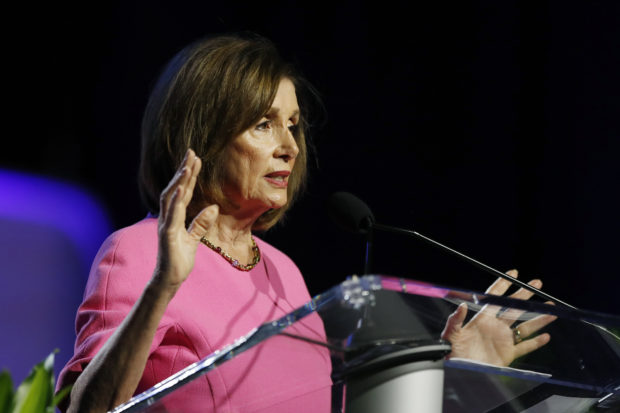Deal sealed on federal budget, ensuring no shutdown, default
WASHINGTON – President Donald Trump and congressional leaders announced late Monday they had struck a critical debt and budget agreement.

Speaker of the House Nancy Pelosi, D-Calif., addresses the NAACP convention, Monday, July 22, 2019, in Detroit. (AP Photo/Carlos Osorio)
The deal amounts to an against-the-odds victory for Washington pragmatists seeking to avoid politically dangerous tumult over the possibility of a government shutdown or first-ever federal default.
The deal, announced by Trump on Twitter and in a statement by Democratic House Speaker Nancy Pelosi and Senate Democratic leader Chuck Schumer, will restore the government’s ability to borrow to pay its bills past next year’s elections and build upon recent large budget gains for both the Pentagon and domestic agencies.
“I am pleased to announce that a deal has been struck,” Trump tweeted, saying there will be no “poison pills” added to follow-up legislation. “This was a real compromise in order to give another big victory to our Great Military and Vets!”
Pelosi and Schumer said the deal “will enhance our national security and invest in middle class priorities that advance the health, financial security and well-being of the American people.”
They claimed credit for winning more than $100 billion worth of spending increases for domestic priorities since Trump took office.
Article continues after this advertisementThe agreement is on a broad outline for $1.37 trillion in agency spending next year and slightly more in fiscal 2021. It would mean a win for lawmakers eager to return Washington to a more predictable path amid political turmoil and polarization, defense hawks determined to cement big military increases and Democrats seeking to protect domestic programs.
Article continues after this advertisementNobody can claim a big win — though they did — but both sides view it as better than a protracted battle this fall that probably wouldn’t end up much differently.
However, it also comes as budget deficits are rising to $1 trillion levels — requiring the government to borrow a quarter for every dollar the government spends — despite the thriving economy and three rounds of annual Trump budget proposals promising to crack down on the domestic programs that Pelosi is successfully defending now.
It ignores warnings from deficit and debt scolds who say the nation’s fiscal future is unsustainable and will eventually drag down the economy.
“This agreement is a total abdication of fiscal responsibility by Congress and the president,” said Maya MacGuineas, president of the Committee for a Responsible Federal Budget, a Washington advocacy group.
“It may end up being the worst budget agreement in our nation’s history, proposed at a time when our fiscal conditions are already precarious.”
The aides who spoke Monday about the emerging deal did so on the condition of anonymity because they were not authorized to speak on the record before a deal was final.
A push by the White House and House GOP forces for new offsetting spending cuts was largely jettisoned, though Pelosi, D-Calif., gave assurances about not seeking to use the follow-up spending bills as vehicles for aggressively liberal policy initiatives.
Fights over Trump’s U.S.-Mexico border wall, other immigration-related issues and spending priorities will be rejoined on follow-up spending bills that are likely to produce much the same result as current law. The House has passed most of its bills, using far higher levels for domestic spending. Senate measures will follow this fall, with levels reflecting the accord.
At issue are two separate but pressing items on Washington’s must-do agenda: increasing the debt limit to avert a first-ever default on U.S. payments and acting to set overall spending limits and prevent automatic spending cuts from hitting the Pentagon and domestic agencies in January.
The threat of the automatic cuts represents the last gasp of a failed 2011 budget and debt pact between former President Barack Obama and then-Speaker John Boehner, R-Ohio, that promised future spending and deficit cuts to cover a $2 trillion increase in the debt. But a bipartisan deficit “supercommittee” failed to deliver, and lawmakers were unwilling to live with the follow-up cuts to defense and domestic accounts. This is the fourth deal since 2013 to reverse those cuts.
Prospects for an agreement, a months-long priority of top Senate Republican Mitch McConnell, R-Ky., became far brighter when Pelosi returned to Washington this month and aggressively pursued the pact with Treasury Secretary Steven Mnuchin, who was anointed lead negotiator instead of more conservative options like acting White House Chief of Staff Mick Mulvaney or hardline Budget Director Russell Vought. /gsg